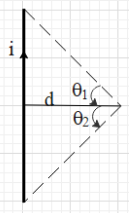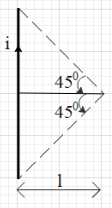Question
Question: The magnetic field at the centre of coil of \(n\) turns, bent in the form of a square of side \(2l\)...
The magnetic field at the centre of coil of n turns, bent in the form of a square of side 2l, carrying current i, is :
A. πl2μ0ni
B. 2πl2μ0ni
C. 4πl2μ0ni
D. πl2μ0ni
Solution
Use the formula for the magnitude of the magnetic field at a point, which is at a perpendicular distance d from the straight conductor carrying some current. Make use of the symmetry of a square.Magnetic field is an invisible space around a magnetic object. A magnetic field is basically used to describe the distribution of magnetic force around a magnetic object.
Formula used:
B=4πdμ0i(sinθ1+sinθ2)
Complete step by step answer:
It is given that there is coil carrying current i, in the shape of a square. The coils have n turns and the length of each side of the square is 2l. Now, consider a straight conductor carrying current i of length l. The magnitude of the magnetic field at a point, which is at a perpendicular distance d from the straight conductor (as shown in the figure) is given as B=4πdμ0i(sinθ1+sinθ2) ….. (i).

The direction of the magnetic field is given by the right hand thumb rule.
In the given case, the coil is in the form of a square.

Due to symmetry, the magnitude of the magnetic field produced by each side of the square, at the centre of the coil is the same. From the right hand thumb rule, the direction of the four magnetic field fields will be inwards. Let us calculate the magnetic field due to any one side. In the figure we can see that for each side the angles θ1 and θ2 are equal to 45∘ each. And the perpendicular distance of the centre from the side is l.
Now, substitute θ1=θ2=45∘ and d=l.
⇒B=4πlμ0i(sin45∘+sin45∘)
⇒B=4πlμ0i(21+21)=22πlμ0i.
This means that the magnetic field produced by each side of the square at the centre is equal to B=22πlμ0i
Since the direction of all four magnetic fields is same, the magnetic field produced by one such coil at the centre is equal to 4B=4(22πlμ0i)=πl2μ0i.
It is given that there are n turns in the coil. Therefore, the net magnetic field at the centre of the coils is equal to πl2nμ0i.
Hence, the correct option is A.
Note: In case of a straight current carrying conductor, the right hand thumb rule says that if we point our thumb in the direction of the current flowing in the conductor, then in the direction in which we curl our other figures will give the direction of the magnetic field line.
